 Tuesday, 19 June 2007
I got a real aha moment when I saw this graph:
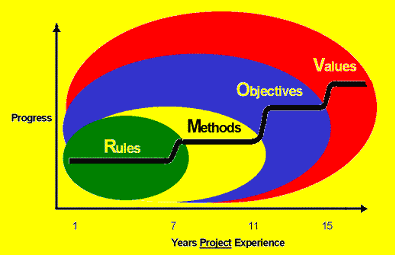
The blog post where I saw it was talking about "management by ..." but I think it also applies to the motivation that individuals are moved by. That is, relative newbies to a job tend to do things a certain way because those are the rules. As they progress over time, most of them move on to "this is the method I use" and then to "my team's objectives are" and finally "this is what my team values." I think this is a hugely important progression to understand.
Let's take one little thing, say source control behaviour - do you check in too often, not often enough, are your comments any good, are your changesets too big or too little, and so on. If I want to direct your source control behaviour I need to know what zone you are in.
- If you're in the "rules" zone, I must tell you the rules for source control. I need to write a long document with lots of examples and if there are exceptions, or different rules for different projects, I need to elaborate them all. Whenever you do something "wrong" I will probably hear that you were just following the rules, and I will need to update the rules to attempt to prevent that problem in the future.
- If you're in the "methods" zone, I must cover source control in the documentation of my methodology, put it into context, show you why we use it and how things you type at step 17 will be used by someone else at step 35. The rules don't need to be so black and white or so detailed, but there may need to be different methodologies for different kinds of projects or circumstances. If I correct you I am still likely to hear that it's because the methodology is flawed.
- If you're in the "objectives" zone, I need only remind you that we need to be able to pick up projects again for a version 2 long after we shipped version 1, or that we need to be able to recover from two people editing a file at once, or that we need to be able to explain to clients which files are different in version 2.3.4 than they were in 2.3.3. The detailed rules can go; you will choose your changeset size and your comments knowing which of our objectives you are supporting when you do so. If you make an incorrect decision and I point it out to you, your response is most likely to be "oh" and then you will adjust your own internal set of rules and methodologies accordingly.
- If you're in the "values" zone, it's even simpler - we value making money on each project, and serving our clients well, and you know that, and you have the capability to make the right decisions in order to support those values. I barely have to manage you, just provide you from time to time with information.
In contrast to the blog where I found this graph, I don't see it as just being a matter of how managers choose to manage their projects and people. I see that some people cannot be motivated by values alone, or objectives alone. Either they lack the career maturity to recognize that supporting the team's objectives is always in their own self-interest, or they lack the skill and knowledge to choose correctly (should I check in now? or wait till I have tested? or wait till I do those other changes?) knowing only what outcomes are important to the team.
I personally don't care for the rules-oriented phase. Writing out exhaustive "if this happens do that" documents is not really fun work. Hearing that a flaw in the document is why something went wrong also doesn't really work for me. Yet it seems all team members (and by this I mean not just my own staff, but my clients and their staff, other vendors, and so on) need to go through this phase when adapting to a new process. Well, knowing it's going on makes it easier for me to cope with it.
Kate
 Monday, 18 June 2007
Here is a neat thing i actually learned about from people complaining about Vista performance. I haven't been having performance problems to speak of (except for that darned copying thing) but I was intrigued to hear about a background process that keeps track of how stable your system is. The Reliability and Performance Monitor is tucked away under a zillion menu options (this blog post leads you there) but I just click the marble and type reli and there it is:
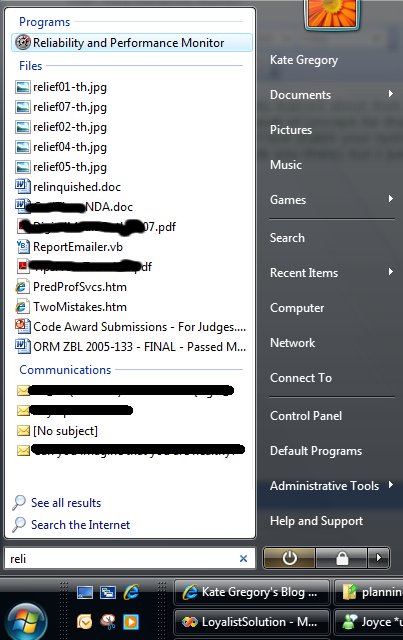
The first thing you get is a performance monitor-type view, to do with as you will:
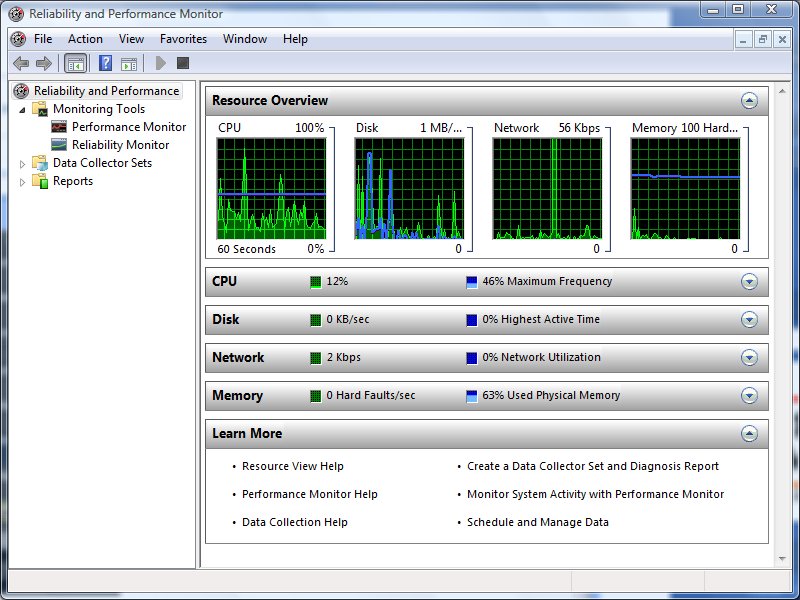
But if you click reliability monitor, you get something really quite new:

Here you see things the system feels were instabilities in my system in late May and early June. Mind you, it has a very persnickety bar when it comes to those red Xs.
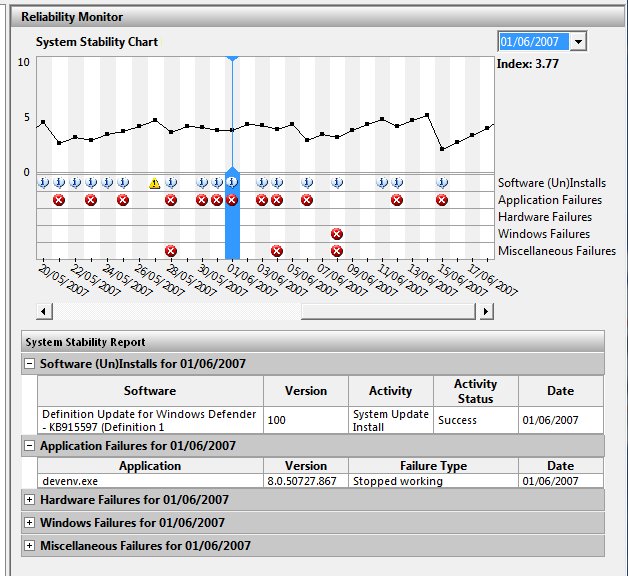
On June 1st, Visual Studio blew up on me. I bet I know what that was, too -- from time to time it blows up when I drop down a list of methods in those bars across the top of the code editor, especially if I try to scroll in the dropdown -- and not only was that recorded, but it contributed to a lower "stability index" for the day. As you can see, the system also records everything I installed (including updates through Windows Update) and everything that failed. It's a pretty neat way to remind yourself what you've been going through. You can also validate wild claims like "Project blows up at least once a week" by scrolling back and counting them. Ah, evidence 
Kate
 Sunday, 17 June 2007
I was helping a mentoring client translate some sample code from VB to C# - he has written a lovely library and a customer wanted to see C# code that called it. The original samples had been written by someone who wasn't in the room, so I could have a bit of a vent. They had made heavy use of the Microsoft.VisualBasic namespace (nothing wrong with that) so as to access familiar (to a VB6 programmer) string manipulation methods. The problem was, these methods were being used to do things like finding the extension given a file name, or extracting a file name from a long path. This work should never be done with Left, Right, and Mid - and using Substring doesn't make it better. There are all kinds of methods in System.IO that manipulate paths and file names in a more robust and localized way than you can possibly do by hand. For my client's code, I ripped out a whole pile of hand written code (including a loop that looked character by character at a string testing to see if each was '\' or not) and replaced it with calls to library methods.
Phil Haack lists a bunch of these (and his commenters even more) in a very useful post. Developers who know what's in System.IO and the other meat-and-potatoes parts of the .NET Framework will write code more quickly, and that code will be better. Never assume you're the first person who wanted to parse a file path, check if a string is a good date, or any of a thousand other general tasks. Trust me, what you want is in there ... look for it.
Kate
 Saturday, 16 June 2007
I brought home a paper copy of MSDN magazine from Tech Ed and found this as one of the cover stories: An Inside Look At The Next Generation Of Visual C++. It's by Tarek Madkour and definitely worth a read. Were you wondering if MFC's wrapper for the new file dialog would be tweaked so you get the all-singing all-dancing new Vista common file dialog? Yes it will. Will there be a class to represent a Command Link? Yes. And a split buttton? Yes. Pretty much all the new controls and dialogs are in the new MFC. There's also resource editor support for PNG, for 32 bit images, and for large icons.
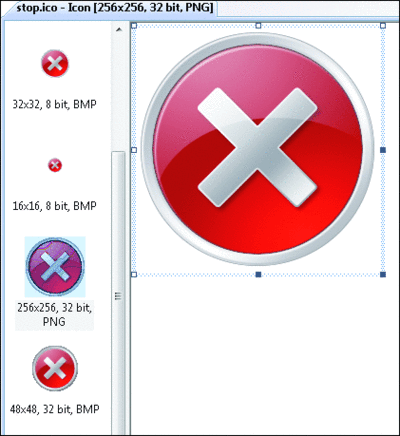
As I mentioned in my blog post about Sarita's Channel 9 Video, UAC support is also a lot easier. Then there's the marshaling library and STL/CLR. Toss in faster builds, and make developers everywhere happy. Roll on, release day.
Kate
 Friday, 15 June 2007
Herb Sutter reports on the April meeting of the ISO C++ standards committee. They are now consistently referring to C++ 09 not C++ 0x (with a hope that x would not be hex, which seems to be turning out ok.) The meeting added features to the draft standard for the language itself (template aliases aka typedef templates, variadic templates, and unicode) and for the standard library (variadic templates, unicode, and rvalue references.)
The next meeting is July 15th - 20th in Toronto. I am trying to plan to be there.
Kate
 Thursday, 14 June 2007

Have you tried writing a gadget yet? They're really simple and can have an immediate impact on your productivity. If you're a Canadian adult, you can enter your gadget into Microsoft Canada's contest and win some serious hardware.
The contest site has plenty of links to get you started and give you some inspiration. You have till July 16th, so get creating!
Kate
 Wednesday, 13 June 2007
I like to let Hugh MacLeod's gapingvoid cartoons rattle around in my brain for a while before I decide if I like them or not. It's a fine line between pithy and banal, after all. This one is working for me:
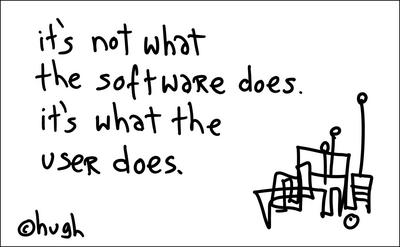
Keeps my focus where it belongs, even when making custom software or mentoring the folks who are making the software. Forest and trees, don'tcha know.
Kate
 Tuesday, 12 June 2007
Have you ever heard the career advice that you should consider doing some volunteer work in your field to gain experience? Sounds like a lovely plan, but how does someone without contacts find volunteer opportunities anyway? Or maybe you have the job you want, but you want to put your time and effort to a good cause, if only you could find one. If you're in Canada, MatchIT.com is just the ticket. Sign up, fill out a form, and get matched with needs from nonprofits. There's lots of folks looking to have their websites redone, or a registration system written, or their servers looked after. It's a chance to make a real difference, so please look into it if you have some time to spare.
Kate
© Copyright 2024 Kate Gregory
Theme design by Bryan Bell
newtelligence dasBlog 2.3.9074.18820   | Page rendered at Thursday, 21 November 2024 06:50:01 (Eastern Standard Time, UTC-05:00)
|
On this page....
Pluralsight Free Trial
Search
Navigation
Categories
Blogroll
Sign In
|